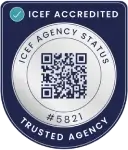Applying for a US student visa can be a daunting process, especially when it comes to meeting financial requirements. One of the crucial elements of the application is demonstrating that you have sufficient funds to cover your tuition, living expenses, and other costs while studying in the US. This blog will guide you through the financial requirements for a US student visa, including the bank balance needed, proof of funds, and essential financial documentation.
Understanding the Financial Requirements for a US Student Visa
1. Visa Types and Financial Requirements
When applying for a US student visa, you will generally apply for one of two main types:
- F-1 Visa: The primary visa for international students pursuing academic studies.
- J-1 Visa: An exchange visitor visa for students participating in exchange programs.
Both visas require proof of financial capability, but the specific requirements can vary based on the visa type and the institution.
2. Factors Influencing Financial Requirements
Several factors affect the financial requirements for a US student visa:
- Institution Type: Public universities often have lower tuition fees compared to private institutions.
- Location of the Institution: Cost of living varies widely depending on the city or state.
- Duration and Level of the Program: Longer programs or advanced degrees generally mean higher costs.
Required Bank Balance for International Students in the USA
1. Estimated Costs for US Education
To estimate the required bank balance, you need to consider:
- Tuition Fees: These vary significantly depending on the institution and program. For example, public universities may charge between $10,000 and $30,000 per year, while private universities can cost between $30,000 and $60,000 annually.
- Living Expenses: Average costs depend on the city. For instance, living in New York or San Francisco can be more expensive compared to cities like Austin or Atlanta. On average, students might spend between $8,000 and $15,000 annually.
- Health Insurance: Many institutions require students to have health insurance, which can cost an additional $1,000 to $2,000 per year.
2. Sample Financial Requirement Calculation
Here’s a simple breakdown for a typical year of study:
- Tuition: $20,000
- Living Expenses: $12,000
- Health Insurance: $1,500
Total: $33,500
This is a rough estimate and may vary based on the factors mentioned earlier.
3.Proof of Sufficient Funds for US Student Visa
-
Acceptable Forms of Proof
To demonstrate financial capability, you must provide evidence of sufficient funds. Here are the common forms of proof:
- Bank Statements: Recent statements showing a balance that meets or exceeds the total estimated costs.
- Sponsorship Letters: If you have a sponsor, a letter detailing their financial support is required.
- Scholarship Letters: Confirmation of any scholarships or financial aid awarded.
4. Minimum Balance Guidelines
- General Guidelines: The US Department of State does not specify exact amounts but requires you to show that you can cover your expenses.
- Institution-Specific Guidelines: Some institutions may provide specific financial requirements or thresholds. Always check with your institution for exact figures.
5. What Happens if You Have Insufficient Funds?
- Visa Interview Challenges: Insufficient funds can lead to visa denial or additional scrutiny.
- Addressing Issues: If you encounter issues, consider increasing your funds, securing a loan, or seeking additional scholarships.
6. Financial Documentation Requirements
I) Documents to Submit
Prepare and submit the following documents for your visa application:
- Bank Statements: Recent and official statements.
- Affidavit of Support: A detailed document from your sponsor, if applicable.
- Additional Documents: Proof of property ownership or investments can strengthen your application.
II) Preparing Your Financial Documents
- Accuracy and Authenticity: Ensure all documents are accurate and up-to-date.
- Certification: Some documents may need to be certified by a notary or other authority.
How to Improve Your Financial Standing for Visa Application?
A) Ways to Increase Your Bank Balance
- Securing Additional Funds: Explore options like education loans or financial support from family.
- Saving Money: Cut down on unnecessary expenses and save aggressively before applying.
B) Alternatives to Demonstrating Financial Capability
- Income Proof from Parents or Guardians: Include detailed proof if they will support you financially.
- Financial Aid and Scholarships: Apply for scholarships and financial aid to reduce the required bank balance.
FAQs
Q) How much bank balance is required for a US student visa?
- The required bank balance varies based on the institution and program, but it should cover tuition, living expenses, and insurance. Typically, it ranges from $30,000 to $60,000 annually.
Q) Can I use a family member’s bank statement for my visa application?
- Yes, you can use a family member’s bank statement, but you must provide an affidavit of support and other relevant documents proving their financial ability to support you.
Q) What happens if I don’t have enough money for my US student visa?
- Insufficient funds can lead to visa denial. You may need to demonstrate additional financial resources or apply for financial aid.
Q) What documents are needed to prove financial capability for a US student visa?
- You will need bank statements, affidavit of support (if applicable), scholarship letters, and possibly proof of property or investments.
Conclusion
Understanding the financial requirements for a US student visa is crucial for a successful application. Ensure you have a clear picture of your estimated costs, gather the necessary proof of funds, and prepare your financial documents meticulously. Start early to address any financial gaps and seek guidance from a visa advisor if needed. With thorough preparation, you can confidently meet the financial requirements and focus on your studies in the US.





